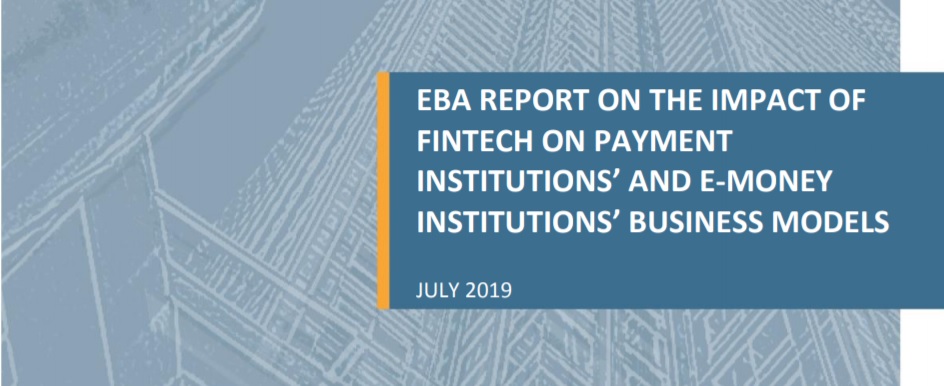
Most institutions are adapting their business models to cope with the competitive pressure and embrace PSD2 changes, while some of them may in parallel embrace the positive impact of FinTech. In the medium to long term, a number of factors will define the transformation of institutions’ business models: (i) the progress of Open Banking and APIs, facilitated partially by PSD2, (ii) the level of implementation of innovative technologies and (iii) the activity of BigTech firms in the financial service sectors. All institutions may need to consider near-term transformation to secure their positions in the value chain, which keeps changing, partly because of FinTech developments.
The European Banking Authority (EBA) published today a thematic Report on the impact of FinTech on payment institutions’ (PIs) and electronic money institutions’ (EMIs) business models.
This Report points out the EBA’s key observations on PIs’ and EMIs’ strategies and business model changes, in particular focusing on the current trends and drivers, the different approaches to FinTech, including their interaction with BigTech firms, and the level of implementation of innovative technologies.
The Report, which is in line with the priorities listed in its FinTech Roadmap, does not foresee or intend to model scenarios for potential future development of institutions. The Report aims to share knowledge and provide support to supervisors and other stakeholders in identifying and understanding the main trends that could impact PIs’ and EMIs’ business models and pose potential challenges to their sustainability.
Based on the EBA’s observations, most PIs and EMIs are adapting their business models to cope with the competitive pressure and embrace PSD2 changes. Most institutions are keen to expand their products and services and enter new markets by (i) leveraging on cross-border services, (ii) requesting a licence to become a credit institution or third party provider (TPP), and/or (iii) embracing the new services provided under the PSD2.
While there is a slight trend towards internal development of products and services using FinTech, without necessarily the involvement of external partners, a significant number of institutions partner with FinTech firms and technology providers for the development of innovative products.
With BigTech firms posing a potential threat to the sustainability of PIs’ and EMIs’ business models, institutions are planning to focus on strengthening customer loyalty in a potential increased participation of BigTech firms. The outlook of the payments sector is quite positive in terms of revenues and profitability, with an overall expectation for increased customer base and new or revamped products, accompanied by an increase in internal FinTech developments and IT spending.
A comparison with the respective report on credit institutions, published by the EBA in July 2018, may suggest a relationship between the growth of the payments sector and the disintermediation in banking, taking into account that incumbent credit institutions reported a negative impact on their payment-related revenues.
PIs and EMIs face different threats, depending on their business model, from the potential impact of an active participation of BigTech firms, the uncertain impact of Brexit as well as the key dependencies on banks and card processors (for some PIs and EMIs). In addition, a number of key challenges will need to be addressed relating to operation resilience and ICT security, operational capacity, regulatory changes, customer education and acquisition and maintenance of skills and talent.
Download the report here
Banking 4.0 – „how was the experience for you”
„To be honest I think that Sinaia, your conference, is much better then Davos.”
Many more interesting quotes in the video below: